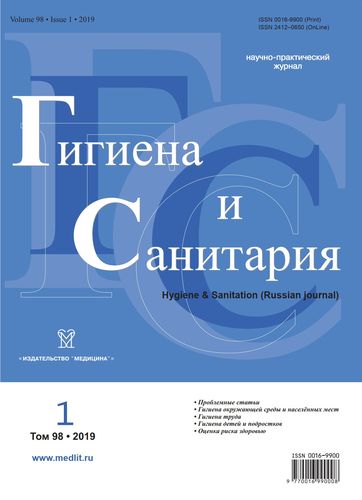Problems of psycho-hygiene in the staff of the penitentiary system
- Authors: Khabriev R.U.1, Polyakova Y.N.2, Spasennikov B.A.3, Speranskaya A.V.4
-
Affiliations:
- N.A. Semashko National Research Institute for Public Health
- Research Institute of the Federal Penitentiary Service
- The Russian Institute of Theatre Arts - GITIS
- Vologda Institute of Law and Economics of the Federal Penitentiary Service
- Issue: Vol 98, No 1 (2019)
- Pages: 118-120
- Section: HEALTH RISK ASSESSMENT
- Published: 14.10.2020
- URL: https://ruspoj.com/0016-9900/article/view/640223
- DOI: https://doi.org/10.47470/0016-9900-2019-98-1-118-120
- ID: 640223
Cite item
Full Text
Abstract
In the article specific, psycho-traumatic conditions of the professional activity of the staff of the penitentiary system are considered. They are associated with the periodically arising threat to life and health, honor and dignity, in the protection and convoy of convicted criminals. The purpose of the study is to identify the problems of psycho-hygienic training of officers of the penitentiary system for performing their professional tasks. The subject of the study is the psycho-hygienic training of officers of the penitentiary system. The subject of the research is the ways of psycho-hygienic training of officers of the penitentiary system. Under the psycho-hygienic training of officers of the penitentiary system, official activity is understood as the formation of a stable psychological state. It ensures effective professional activity. Psychological readiness to perform professional activities is a factor in the effective service of officers of the penitentiary system. Simultaneously - this is an important condition of psycho-hygiene. Psychological readiness needs to be diagnosed during the admission to the service and developed in the process of adaptation during the initial preparation. There is a psychological selection of candidate's compliance with the required conditions of the service. But, most young officers have poor psychological preparedness to perform professional tasks. It is proposed to strengthen the psycho-hygienic aspects of the educational process; to assess the level of psycho-hygienic training of officers of the penitentiary service at the stage of their professional selection; organize the psychotherapeutic support of officers of the penitentiary system during the initial training with the aim of developing their professionally important qualities as the basis for psycho-hygienic training; consider psycho-hygienic training for performance as one of the determining factors in the overall assessment of officers of penitentiary institutions.
About the authors
R. U. Khabriev
N.A. Semashko National Research Institute for Public Health
Author for correspondence.
Email: noemail@neicon.ru
ORCID iD: 0000-0003-2283-376X
Russian Federation
Ya. N. Polyakova
Research Institute of the Federal Penitentiary Service
Email: ynpolyakova@yandex.ru
ORCID iD: 0000-0002-3852-3128
Канд. психол. наук, ст. науч. сотр. НИЦ-1, ФКУ Научно-исследовательский институт ФСИН России.
e-mail: ynpolyakova@yandex.ru
Russian FederationBoris A. Spasennikov
The Russian Institute of Theatre Arts - GITIS
Email: borisspasennikov@yandex.ru
ORCID iD: 0000-0002-5668-6457
MD, Ph.D., professor, chief researcher of the Research Institute of the Federal Penitentiary Service, Moscow, 125009, Russian Federation.
e-mail: borisspasennikov@yandex.ru
Russian FederationA. V. Speranskaya
Vologda Institute of Law and Economics of the Federal Penitentiary Service
Email: noemail@neicon.ru
ORCID iD: 0000-0002-2116-3525
Russian Federation
References
- Baburin S.V., Abaturov N.S., Chirkov A.M. Methodological approaches to the problem of psychological stress among correctional officers and prisoners. Bulletin of the Institute: crime, punishment, correction. [Vestnik instituta: prestuplenie, nakazanie, ispravlenie]. 2014; (4): 50–8.
- Spasennikov B.A., Pertly L.F., Kaluzhina M.A. Cerebral Pathology and Criminal Behavior. Research Journal of Pharmaceutical, Biological and Chemical Sciences. 2017; (8, 3): 1109-15.
- Polyakovа Y.N. Psychological support of students of educational centres of the Federal penitentiary service of Russia as the factor of activization of development of professionally important qualities. Tambov scientific psychological school: results of the 20-th anniversary of TSU named after G.R. Derzhavin: materials of VII International seminar of young scientists and graduate students (April 17, 2015). [Tambovskaja nauchnaja psihologicheskaja shkola: itogi 20-letija TGU imeni G.R. Derzhavina: materialy VII Mezhdunarodnogo seminara molodyh uchenyh i aspirantov (17 aprelja 2015 g.)]. Tambov; 2015, pp. 150–7.
- Spasennikov B.A., Spasennikova M.G. Neuropsychiatric disorders and criminal behavior. Russian Journal of Criminology [Vserossiiskii kriminologicheskii zhurnal], 2016; (10, 4): 665–70.
- Galich V.T. Psychological readiness of employees of the penal system to act in extreme situations. Vladimir; 2015.
- Averkin R.G. Psychology. St. Petersburg; 2001.
- Izard K. E. Psychology of emotions. St. Petersburg; 2015.
- Druzhinin V.N. Psychology of General abilities. St. Petersburg; 2007.
- Bernard R.M., Borokhovski E., Schmid R.F. A metaanalysis of blended learning and technology in higher education. Journal of Computing in Higher Education. 2014; (26): 87–122.
- Moiseeva A.A. Psychological possibilities of the method of proverbs in the study of the psyche and the personality of man. Bulletin of Novgorod State University. 2003; (74): 85– 8.
- Kopp R.R. Metaphor Therapy: Using Client Generated Metaphors in Psychotherapy. Bristol; 1995.
- Samadzadeh M., Abbasi M., Shahbazzadegan B. Comparison of sensation seeking and self-esteem with mental health in professional and amateur athletes, and non-athletes. Social and Behavioral Sciences. 2011; (15): 1942–50.
- Practical psychodiagnostics. Samara; 2001.
- Fetiskin N.P., Kozlov V.V., Manuylov G.М. Test of emotional intelligence of N. Hall. Socio-psychological diagnosis of personality and small groups. Moscow; 2002.
Supplementary files









